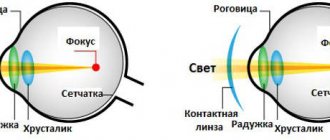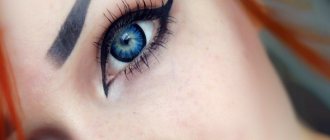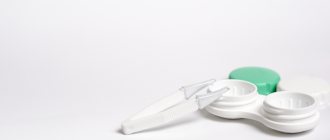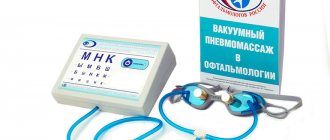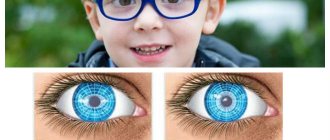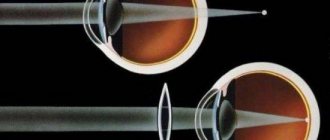Contact lenses for a month, like other means of vision correction, must be selected with the help of an ophthalmologist. A visit to a specialist is required to eliminate contraindications to wearing such contact optics, as well as to correctly select its parameters and decide on the wearing mode (daytime, flexible, prolonged, continuous).
The line of modern monthly lenses includes contact products for the correction of myopia and hyperopia up to −20.00 diopters (for example, Proclear from CooperVision), for the correction of astigmatism (Bioclear Toric from Sauflon) and presbyopia (Proclear Multifocal from CooperVision), as well as tint (FreshLook Dimensions from Alcon) and color (Butterfly Color One Month from Ophthalmix) optical products for quickly changing your image (including diopters).
Characteristics of good contact lenses
There are many types of contact optics. Lenses vary in terms of replacement period, wearing mode, material used in production, purpose and other criteria. It is incorrect to talk about which contact lenses are the best based on these indicators, which can also be called the parameters of ophthalmic products. It all depends on the individual physiological characteristics of a person, his preferences, financial capabilities and other factors.
If we are talking about good contact lenses, then we should mainly consider the issue of quality.
High-quality optical products meet all declared functional characteristics. They are safe for the organs of vision, perform their optical and decorative functions, and also do not cause discomfort (provided they are selected correctly).
To avoid purchasing low-quality optics, you need to purchase them in specialized stores that have the necessary certificates and licenses. Buying medical products in passages or other dubious places is unacceptable. In addition, this should not be done without a preliminary examination by an ophthalmologist. This way you risk harming your visual health and wasting your money. Despite the fact that contact correction products are sold without a prescription, only an ophthalmologist can determine which contact lenses are best for you.
How to choose the right lenses for your eyes?
Before you go shopping, you must make an appointment with an ophthalmologist. There are no universal or best contact lenses that would suit absolutely everyone. Even if you need colored optical products that do not have diopters and perform purely decorative functions, you still need to undergo an examination. In addition to visual acuity, the doctor calculates such parameters of the visual apparatus as radius of curvature and diameter. The specialist will also examine the cornea, determine its thickness, and identify contraindications to wearing contact optics, if any. In accordance with all these parameters, the doctor will select the lenses you need for your eyes.
You will wear optical products for the first time in the ophthalmologist's office. The doctor will check your vision again, but this time with lenses. If they cause discomfort or incorrectly correct your diagnosed refractive error, you need to select a new pair.
At the clinic, you will learn how to put on and take off ophthalmic products, how to care for them, and receive other operating instructions. An ophthalmologist can write you a prescription for a specific model or recommend a manufacturer whose product range you can find the best contact lenses just for you.
Often, when choosing lenses, the buyer is faced with choosing the type of contact optics based on the replacement period. There are several types: daily, frequently scheduled replacement (bi-weekly), scheduled replacement (monthly and quarterly) and traditional ophthalmic products. Which lenses are better, disposable or scheduled replacement? This is one of the most common questions asked by future users of contact correction products.
About Us
I would also like to see user reviews. So I'll start with myself =)It took me a long time to decide to go to the clinic and change something, I looked closely for a long time, read reviews, then for a while all these problems faded into the background, I had to work on my diploma and look for a job. But one fine day I decided that enough was enough, it was time to put an end to this torment. Soft contact lenses, although comfortable, but in the evening my eyes constantly turned red, blood vessels popped out, and even if something got under the lens, I wanted to howl in pain. And if the lens fell out (it did happen to me once), then it seemed that you had lost not the lens, but the eye... My first phrase was: “It’s like I’ve lost my eye,” and panic.
It was scary to go to an appointment for the first time, scared of the unknown, I didn’t know what to expect, and, to be honest, I’m very afraid of doctors, even though I’m no longer a little girl. But after the examination, I was so impressed, everything was so fast, so... I don’t even know, modern, understandable. An hour later I already knew everything about my eyes =)
The doctor offered me two types of correction for my eyes (since I immediately excluded laser correction from the possible options, I can’t decide on it yet). I chose night lenses.
When the nurse showed how to put them on and take them off, I very accurately described the process itself - “Ugh.” But as it turned out, it was all “ugh” only at first glance.
The first night was terrible. It was impossible to sleep, the lenses were in the way. In the morning we rushed to the hospital. When honey my sister finally took them off, I was so happy =) And after the doctor put drops in and applied some kind of gel and said that you can not put them on for 2 days and just drip the drops, I wanted to sing and dance with joy.
But then, when the doctor was convinced that everything was fine with his eyes, he had to put the lenses back on and sleep in them for a whole week.
After the first night, I didn’t notice any results at all, but what can I say, even after the first week everything was not as good as I would like. I had already accepted that with my complex astigmatism and myopia, this was probably the limit... and when a halo appeared on white objects against a dark background, I completely panicked.
But that was only the first week. In the middle of the second week, the halos suddenly disappeared, my vision improved significantly, the lenses stopped interfering, and in the morning I stopped feeling them altogether.
And what’s most important is that I see =))) I see with them and without them =) At first I couldn’t understand how you could still read or watch TV in them at night, because you can only be in them with your eyes closed, because when you blink you feel wild discomfort. Now I can put them on and read a little more before bed. I finally learned to take them off in the morning. My eyes look much better, healthier, they don’t turn red in the evening and I feel great, no more worries that something will get under the lens, I can run, jump, swim and not be afraid.
Since I live in Kyiv, naturally I undergo a course of refractive therapy here, using Paragon lenses. So far I'm very pleased with the results =)))
And by the way, I have complex astigmatism, and - 5.25 on one and - 4 with something on the other.
What contact lenses are considered the best?
What types of contact lenses are there and which type should you choose? This is a question that concerns many people with vision problems. Of course, it is impossible to name a type of optics that would suit everyone. Moreover, this is difficult to do in relation to a specific model. To understand which lenses are best for you, you need to consider the main advantages and disadvantages of each type.
One-day ones are the most hygienic and easy to use. There is no need to look after them. After removal, you throw away the optical products and put on a fresh pair the next time. Thanks to this, deposits that are harmful to eye health do not have time to accumulate on them. You will not introduce bacteria and germs into your eyes with poorly disinfected contact lenses. Disposable models save time and avoid various infectious ophthalmological diseases. Daily contact lenses are a good choice for:
- beginners who are just getting used to them and are not ready to take care of them every day;
- people with a fast pace of life that does not allow them to spend time caring for their optics.
The only drawback of daily contact lenses is their high cost compared to routine replacement lenses.
Two-week ophthalmic products are hygienic and easy to use. Such models have high levels of moisture content and breathability, due to which they can be worn in flexible or extended modes, that is, for several days in a row, without taking them off even before bed.
Monthly lenses are the most popular type among most buyers. The advantage of monthly optical products is the optimal price-quality ratio. They meet the requirements of hygiene (subject to careful care), safety and comfort and have an affordable price.
Quarterly optical products are valid for three months. Using such lenses you can save a lot of money. However, in addition to the usual care products, you will have to purchase preparations for deeper cleaning, since protein, calcium and lipid deposits will accumulate in larger quantities on the surface of the lenses.
The traditional replacement schedule is the most financially beneficial. Such ophthalmic products have a service life of 6 months or more. Another advantage is their durability. When used carefully, traditional lenses never break or lose their functional properties. The disadvantage is that they are made of dense materials, which may not be suitable for people with sensitive corneas. They will cause discomfort in the form of pain, redness of the sclera, burning and itching in the eyes, as a result of which normal wearing them will become impossible. These patients are better off using daily contact lenses and frequent scheduled replacement.
It is difficult to say which of the listed lenses is better for the eyes. When choosing the type of optical products, you should base your choice on convenience, practicality and hygiene. You need to take into account your lifestyle and financial capabilities.
The doctor can only advise you on the most optimal option in terms of physical and other parameters; the choice in favor of a model with a specific replacement schedule remains with the buyer.
Most ophthalmologists recommend that novice contact product users stick to disposable lenses to get used to them and the rules for their use. More experienced people prefer models with a long service life.
Knowing which lenses will suit you in terms of functional characteristics, all that remains is to decide on a specific manufacturer and model.
Contact lens manufacturers: which are the most popular?
There are quite a lot of companies on the world market that specialize in the production of contact products. Each of them positions its product as the best, highest quality, and most reliable. You should not completely trust the information you hear and see in advertising. There are a number of criteria that allow us to create a conditional rating of the best contact lens manufacturers:
- compliance of product quality with international standards;
- approval by ophthalmologists;
- popularity among buyers.
Based on these factors, we present a rating of the best manufacturers. It includes:
Johnson & Johnson (Acuvue) is one of the largest companies producing lenses, care products, accessories and other products. The company is known in the world market as a supplier of high-comfort lenses. Particularly popular are the one-day models from Johnson & Johnson, which are often prescribed by ophthalmologists to patients.
Alcon/Ciba Vision. The holding has existed since 1945. In addition to lenses, the company’s multifunctional solutions, which are suitable for any type of contact optics, are in great demand.
Bausch+Lomb is an American manufacturer whose history dates back to the 19th century. For a century and a half, the company has been caring for the health of people around the world, producing high-quality and reliable contact correction products.
Cooper Vision is one of the leaders in the creation of ophthalmic products and related products. Toric lenses from this manufacturer are very popular.
Interojo is a South Korean company that has become famous for producing optical products with decorative functions. Interojo colored contact lenses surprise with their variety and are known throughout the world.
The companies presented are considered by many to be the best. They use the latest technologies and high-quality materials, introduce all the latest scientific achievements into production, constantly improve their methods and systematically replenish their product range with unique new products.
The best lenses for the month
The main criteria for assessing the quality of contact products, according to user reviews, were the comfort of wearing them, ease of putting on and taking off, impeccable optical characteristics and, of course, an affordable price. Buyers of popular online contact optics stores vote with rubles for the following models (top five in descending order of popularity):
- Silicone hydrogel with gas permeability 138 Dk/t Air Optix Aqua from Alcon.
- Ultra-thin Pure Vision 2 from Bausch + Lomb.
- Biofinity biocompatible from CooperVision.
- Spherical Biomedics 55 Evolution UV from CooperVision.
- Air Optix Colors from Alcon.
